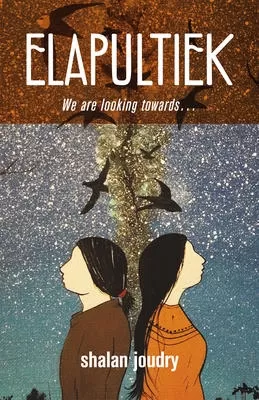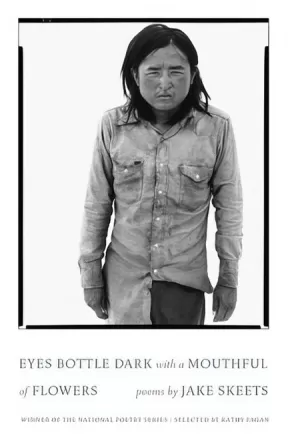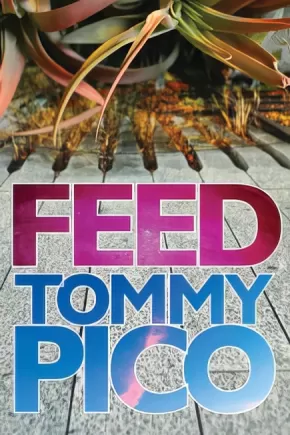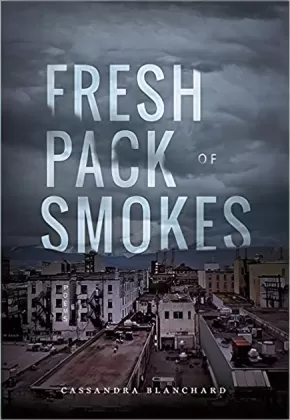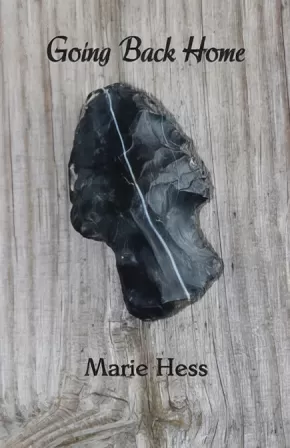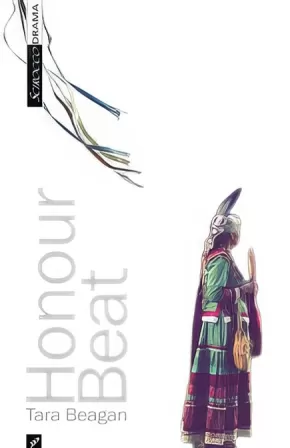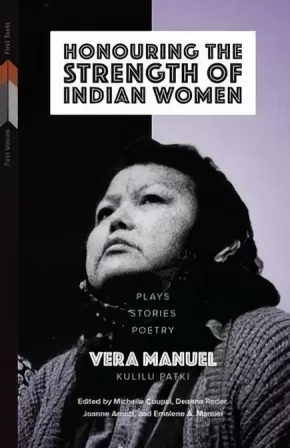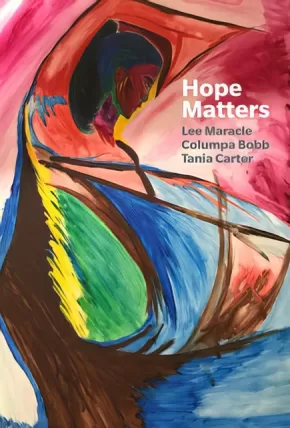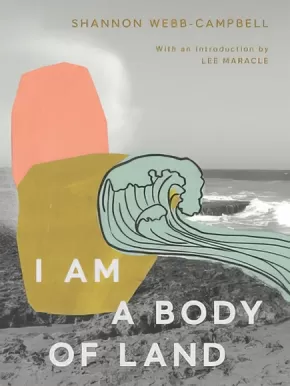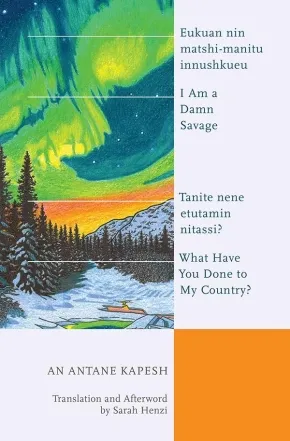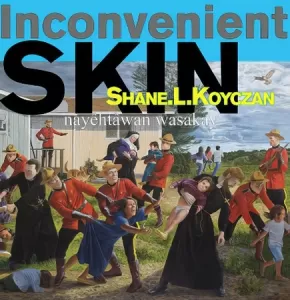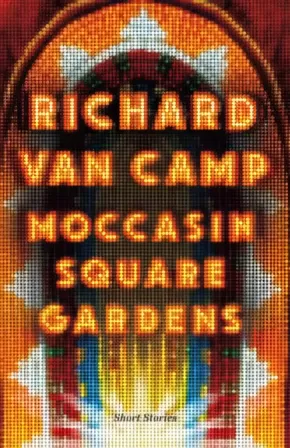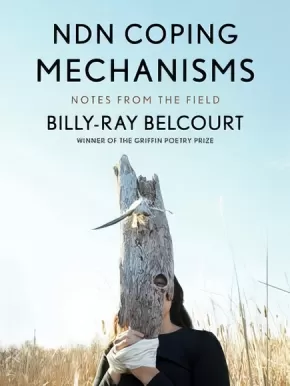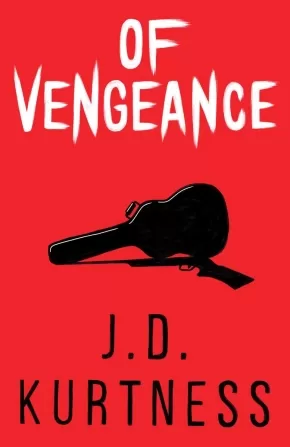
Fiction
361
-
375
of
568 Results;
Sort By
Go To
of 38
Elapultiek (We Are Looking Towards): A Play
$19.95
Format:
Paperback
Text Content Territories:
Indigenous Canadian; First Nations; Mi'kmaq;
Grade Levels: 12; University/College;
ISBN / Barcode: 9781988286662
Synopsis:
Synopsis:
Set in contemporary times, a young Mi'kmaw drum singer and a Euro-Nova Scotian biologist meet at dusk each day to count a population of endangered Chimney Swifts (kaktukopnji'jk). They quickly struggle with their differing views of the world. Through humour and story, the characters must come to terms with their own gifts and challenges as they dedicate efforts to the birds. Each "count night" reveals a deeper complexity of connection to land and history on a personal level.
Inspired by real-life species at risk work, shalan joudry originally wrote this story for an outdoor performance.
Elapultiek calls on all of us to take a step back from our routine lives and question how we may get to understand our past and work better together. The ideal of weaving between Indigenous and non-Indigenous worlds involves taking turns to speak and to listen, even through the most painful of stories, in order for us all to heal. We are in a time when sharing cultural, ecological, and personal stories is vital in working towards a peaceful shared territory, co-existing between peoples and nature.
"It's a crucial time to have these conversations," offers joudry. "The power of story can engage audience and readers in ways that moves them to ask more questions about the past and future."
Additional Information
96 pages | 6.00" x 9.00"
Eyes Bottle Dark with a Mouthful of Flowers: Poems
$23.95
Format:
Paperback
Text Content Territories:
Indigenous American; Native American; Navajo (Diné);
Grade Levels: University/College;
ISBN / Barcode: 9781571315205
Synopsis:
Synopsis:
Selected by Kathy Fagan as a winner of the 2018 National Poetry Series, Eyes Bottle Dark with a Mouthful of Flowers is a debut collection of poems by a dazzling geologist of queer eros.
Drunktown, New Mexico, is a place where men “only touch when they fuck in a backseat.” Its landscape is scarred by violence: done to it, done on it, done for it. Under the cover of deepest night, sleeping men are run over by trucks. Navajo bodies are deserted in fields. Resources are extracted. Lines are crossed. Men communicate through beatings, and football, and sex. In this place, “the closest men become is when they are covered in blood / or nothing at all.”
But if Jake Skeets’s collection is an unflinching portrait of the actual west, it is also a fierce reclamation of a living place—full of beauty as well as brutality, whose shadows are equally capable of protecting encounters between boys learning to become, and to love, men. Its landscapes are ravaged, but they are also startlingly lush with cacti, yarrow, larkspur, sagebrush. And even their scars are made newly tender when mapped onto the lover’s body: A spine becomes a railroad.“Veins burst oil, elk black.” And “becoming a man / means knowing how to become charcoal.” Rooted in Navajo history and thought, these poems show what has been brewing in an often forgotten part of the American literary landscape, an important language, beautiful and bone dense.
Sculptural, ambitious, and defiantly vulnerable, the poems of Eyes Bottle Dark with a Mouthful of Flowers are coal that remains coal, despite the forces that conspire for diamond, for electricity.
Reviews
“Jake Skeets writes with such sparse yet full beauty, you sometimes don’t know where the source of the power of these poems comes from. It is in the power of his language, in the craft, of course. It is in how the brutal experience of pain and loss can become a thing of beauty, which is where grace lives, which is where the best art comes from. There is so much bottle-dark beauty here. Skeets is a new, essential voice in poetry, in literature.”—Tommy Orange
"Incredibly beautiful . . . Skeets's simple lines are highly impactful as they explore the complexities of love, desire and drunkenness and dirt and death."—Electric Literature
"Skeets's raw debut offers beautiful imagery and memorable emotional honesty . . . [this collection] subtly rebukes the hypermasculinity that breeds homophobia and violence and excoriates the centuries of oppression that have caused the scourge of alcohol abuse in Native American communities."—Publishers Weekly
“On its surface, Eyes Bottle Dark with a Mouthful of Flowers is an examination of toxic masculinity through the lens of a queer, indigenous Southwesterner, a book in which alcoholism, violence, and sex under cover of night are both ruefully and sensually described. But experiencing Jake Skeets’s collection is more akin to listening to a musical score to, or watching the choreography of, one Diné man’s vivid boyhood, the family and community of that boyhood, and the landscape holding them all. Indeed, like a lover, the land of these poems enters and ornaments Skeets’s men, old and young, dead and alive. His images haunt, and his use of repetition, field, and fragment provide the book’s structural genius. His is a major debut that feels to me timely and timeless—‘boys only hold boys / like bottles’—and is my singular joy to introduce.”—Kathy Fagan
“Jake Skeets takes us to ‘The Indian Capital of the World,’ a landscape of erosion and erasure, where ‘boys only hold boys / like bottles’ and eros is a dangerous thing. In the brush and horseweed, ghosts and trains and abandoned trailers, a young Diné attempts to answer all the question marks of adolescence and early adulthood, desire and death commingling around him. These are poems born of unspokenness, testing the limits of language, love, and silence.”—D. A. Powell
"An amazing debut collection from Diné poet Jake Skeets that explores his experience and that of Native peoples with the American Southwest. Skeets's ability to use form and innovate with structure amplify his innate talent for constructing language that is simultaneously lush and razor sharp. Grappling with alcoholism, queer sexuality, and toxic masculinity, his poems confront and challenge; but through its swirl of violence and beauty, Eyes Bottle Dark with a Mouthful of Flowers is always vividly gorgeous."—Caleb Masters, Bookmarks
Additional Information
96 pages | 5.50" x 8.50"
Feed
$21.95
Format:
Paperback
Text Content Territories:
Indigenous American; Native American;
Grade Levels: University/College;
ISBN / Barcode: 9781947793576
Synopsis:
Synopsis:
From the Winner of the Whiting Award, an American Book Award, and finalist for a Lambda, Tommy Pico's Feed is the final book in the Teebs Cycle.
Feed is the fourth book in the Teebs tetralogy. It's an epistolary recipe for the main character, a poem of nourishment, and a jaunty walk through New York's High Line park, with the lines, stanzas, paragraphs, dialogue, and registers approximating the park's cultivated gardens of wildness. Among its questions, Feed asks what's the difference between being alone and being lonely? Can you ever really be friends with an ex? How do you make perfect mac & cheese? Feed is an ode of reconciliation to the wild inconsistencies of a northeast spring, a frustrating season of back-and-forth, of thaw and blizzard, but with a faith that even amidst the mess, it knows where it's going.
Reviews
"Funny, irreverent, profound. This book is an ode to love and language and food and what right now sounds like. It’s also a meditation on what it means to belong on/to this planet/universe. Delivered in headlines, texts, conversations, song lyrics, puns, rhymes, and speculation about the possibility of life on other planets, Tommy Pico’s Feed sprawls across time and this country. It is endlessly inventive and stays fun while bringing the heat and weight of a world we’re all helplessly watching burn down. As his character/AKA Teebs says of Oakland rapper Two $hort, the same is true of Tommy Pico in this book and in general: Vigor is the art he argues for."—Tommy Orange
"Tommy Pico’s Feed is the poet’s most ambitious work yet. Part tour diary, part tracklist, part play, part by part Pico tops his epic run of books off with this gut-wrenching, gut-busting, gutter mouth offering of a body in lust, in isolation, in danger, in memory, in future and all the transits between. Feed is a feast of Pico’s signature intellect, humor, and linguistic demolition—all sharper than ever. No one corrals our day’s chaos like Pico, who serves it up to us as some of the wildest verse the world has ever seen." —Danez Smith
Additional Information
84 pages | 6.00" x 9.00"
Fresh Pack of Smokes
$18.95
Text Content Territories:
Indigenous Canadian; First Nations; Tutchone; Northern Tutchone; Selkirk First Nation;
Grade Levels: 12; University/College;
ISBN / Barcode: 9780889713529
Synopsis:
Synopsis:
“This night in Oppenheimer Park Dan asked me to shit-kick this chick in the face as she owed money and I said no because I didn’t know who she was and I wasn’t about to play with fire so he sat on the bench then stood up and did a flying kick twice to her chin and she convulsed and passed out he said he didn’t want to spill blood because she had HIV…”—“Tales”
Dissecting herself and the life she once knew living in Vancouver’s Downtown Eastside as a bonafide drug addict, Blanchard writes plainly about violence, drug use and sex work in Fresh Pack of Smokes, offering insight into an often overlooked or misunderstood world.
Reviews
“Reading Cassandra Blanchard’s debut poetry collection Fresh Pack of Smokes feels like, to borrow a phrase from her work, someone “poured a bucket of blood” on your head. Such visceral images flood the pages of Blanchard’s autobiographical stories, pulling readers in with humanizing force.” - Emma Cooper, The Tyee
Educator Information
Recommended in the Canadian Indigenous Books for Schools 2019-2020 resource list as being useful for grade 12 students for the following subjects: English Language Arts, Social Justice.
Contains foul and sexual language, graphic content, violence, interpersonal abuse, and drug use, which may be disturbing to some readers.
Additional Information
96 pages | 5.50" x 8.00"
Going Back Home (5 in stock) - ON SALE
$15.96 $19.95
Format:
Paperback
Text Content Territories:
Indigenous Canadian; First Nations; Haudenosaunee (Iroquois); Kanyen'keha:ka (Mohawk);
Grade Levels: University/College;
ISBN / Barcode: 9781772310894
Synopsis:
Synopsis:
Written by a Mohawk Institute Residential School survivor, this is a fierce and candid story that reveals the heartbreaking trauma of that tragic time in our history. The author portrays how the ongoing impact of the residential schools confinements has affected Indigenous communities over several generations and has contributed to many social problems that continue to exist today. By exploring that devastating history, the author finds and celebrates the resilient and hopeful spirit that many residential school survivors, like herself, have managed to retain in the face of horror and torment.
Additional Information
160 pages | 5.50" x 8.50"
Honour Beat
$15.95
Format:
Paperback
Text Content Territories:
Indigenous Canadian;
ISBN / Barcode: 9781927922477
Synopsis:
Synopsis:
Two grown sisters face off over their mother's deathbed. Together they confront one another, their own identities, and what will remain when their mom leaves this world. A contemporary look at the significance of faith and family, Honour Beat evokes both laughter and tears as three women grapple with one of life's most difficult inevitabilities.
Reviews
"Honour Beat is an important work of art...It celebrates -- honours --women as the givers and sustainers of life...The ending is extraordinary." -Globe & Mail
"The final uplifting, spiritual moments of Honour Beat will linger with you long after you've left the theatre...the beautiful sentiments at the heart of the play." -Calgary Herald
Educator Information
Recommended in the Canadian Indigenous Books for Schools 2019-2020 resource list as being useful for grades 10 to 12 for English Language Arts, Acting, Drama, and Social Studies.
Includes mature subject matter with references to trauma, rape, and sexual and physical abuse.
Additional Information
80 pages | 5.50" x 8.50"
Honouring the Strength of Indian Women: Plays, Stories, Poetry
$24.95
Format:
Paperback
Text Content Territories:
Indigenous Canadian; First Nations; Ktunaxa (Kootenay); Salish; Interior Salish; Secwepemc (Shuswap);
Grade Levels: University/College;
ISBN / Barcode: 9780887558368
Synopsis:
Synopsis:
This critical edition delivers a unique and comprehensive collection of the works of Ktunaxa-Secwepemc writer and educator Vera Manuel, daughter of prominent Indigenous leaders Marceline Paul and George Manuel. A vibrant force in the burgeoning Indigenous theatre scene, Vera was at the forefront of residential school writing and did groundbreaking work as a dramatherapist and healer. Long before mainstream Canada understood and discussed the impact and devastating legacy of Canada’s Indian residential schools, Vera Manuel wrote about it as part of her personal and community healing. She became a grassroots leader addressing the need to bring to light the stories of survivors, their journeys of healing, and the therapeutic value of writing and performing arts.
A collaboration by four Indigenous writers and scholars steeped in values of Indigenous ethics and editing practices, the volume features Manuel’s most famous play, "Strength of Indian Women"—first performed in 1992 and still one of the most important literary works to deal with the trauma of residential schools—along with an assemblage of plays, written between the late 1980s until Manuel’s untimely passing in 2010, that were performed but never before published. The volume also includes three previously unpublished short stories written in 1988, poetry written over three decades in a variety of venues, and a 1987 college essay that draws on family and community interviews on the effects of residential schools.
Reviews
“An invaluable contribution to our literature about residential school experiences and the effects of transgenerational trauma. With so many current projects focused on “reconciliation,” this republication of Vera Manuel’s works recalls the often forgotten side of the equation: the truth, unvarnished by politics or bureaucracy.”– Jesse Archibald-Barber, Associate Professor of Indigenous Literatures and Performance, First Nations University of Canada
“Layered with intergenerational wisdom, replete with lived experience, this collection deftly presents both the devastating legacy of residential schools and the complex systems of care that sustain Indigenous women and fuel Indigenous resurgence.”– Carleigh Baker, author of Bad Endings
Educator & Series Information
This book is part of the First Voices, First Texts series.
Topics: Indigenous Studies, Literature, Performing Arts, Poetry.
Additional Information
416 pages | 5.50" x 8.50" | 13 b&w photographs | bibliography
Hope Matters (Poetry)
$18.00
Format:
Paperback
Text Content Territories:
Indigenous Canadian; First Nations; Salish; Coast Salish; Sto:lo;
ISBN / Barcode: 9781771664974
Synopsis:
Synopsis:
Hope Matters, written by multiple award-winner Lee Maracle, in collaboration with her daughters Columpa Bobb and Tania Carter, focuses on the journey of Indigenous people from colonial beginnings to reconciliation.
Maracle states that the book, "is also about the journey of myself and my two daughters." During their youth, Bobb and Carter wrote poetry with their mother, and eventually they all decided that one day they would write a book together. This book is the result of that dream. Written collaboratively by all three women, the poems in Hope Matters blend their voices together into a shared song of hope and reconciliation.
Educator Information
Recommended in the Canadian Indigenous Books for Schools 2019-2020 resource list as being useful for grades 10 to 12 in the areas of Creative Writing, English Language Arts, Media Studies, and Social Studies.
This poetry contains some mature language/subject matter.
Additional Information
104 pages | 5.25" x 8.00"
I Am a Body of Land
$18.00
Format:
Paperback
Text Content Territories:
Indigenous Canadian; First Nations; Mi'kmaq;
ISBN / Barcode: 9781771664776
Synopsis:
Synopsis:
I Am a Body of Land by Shannon Webb-Campbell explores poetic responsibility and accountability, and frames poetry as a form of revisioning. In these poems, Webb-Campbell returns to her own text Who Took My Sister?, to examine her self and to decolonize, unlearn, and undo harm. By reconsidering individual poems and letters, Webb-Campbell's confessional writing circles back upon itself to ask questions of her own settler-Indigenous identity and belonging to cry out for community, and call in with love.
With an introduction by multiple award-winning writer and activist Lee Maracle.
Reviews
“Shannon Webb-Campbell’s work forces readers out of polite conversation and into a realm where despair and hard truths are being told, being heard and finding the emotional strength to learn from it, find our way out and embrace our beauty as Indigenous women.”—Carol Rose Daniels, author of Hiraeth and Bearskin Diary, winner of the First Nations Communities READ Award and the Aboriginal Literature Award.
“Poetry awake with the winds from the Four Directions, poetry that crosses borders, margins, treaties, yellow tape warning: Police Line. Do Not Cross. Poetry whose traditional territory, through colonization, has become trauma and shame. Unceded poetry. Read. Respect. Weep.”—Susan Musgrave, author of Origami Dove
Educator Information
Recommended in the Canadian Indigenous Books for Schools 2019-2020 resource list as being useful for grades 10 to 12 in the areas of Media Studies, Social Studies, and English Language Arts.
Additional Information
74 pages | 5.25" x 8.00"
I Am a Damn Savage; What Have You Done to My Country?
$22.99
Format:
Paperback
Text Content Territories:
Indigenous Canadian; First Nations; Innu (Montagnais-Naskapi);
Grade Levels: University/College;
ISBN / Barcode: 9781771124089
Synopsis:
Synopsis:
Quebec author An Antane Kapesh's two books, Je suis une maudite sauvagesse (1976) and Qu'as-tu fait de mon pays? (1979), are among the foregrounding works by Indigenous women in Canada. This English translation of these works, presented alongside the revised Innu text, makes them available for the first time to a broader readership.
In I Am a Damn Savage, Antane Kapesh wrote to preserve and share her culture, experience, and knowledge, all of which, she felt, were disappearing at an alarming rate because many Elders – like herself – were aged or dying. She wanted to publicly denounce the conditions in which she and the Innu were made to live, and to address the changes she was witnessing due to land dispossession and loss of hunting territory, police brutality, and the effects of the residential school system. What Have You Done to My Country? is a fictional account by a young boy of the arrival of les Polichinelles and their subsequent assault on the land and on native language and culture.
Through these stories Antane Kapesh asserts that settler society will eventually have to take responsibility and recognize its faults, and accept that the Innu – as well as all the other nations – are not going anywhere, that they are not a problem settlers can make disappear.
Additional Information
216 pages | 5.25" x 8.00" | Translation and Afterword by Sarah Henzi
Inconvenient Skin / nayêhtâwan wasakay
$29.95
Artists:
Format:
Hardcover
Text Content Territories:
Indigenous Canadian;
ISBN / Barcode: 9781926886510
Synopsis:
Synopsis:
Inconvenient Skin challenges how reconciliation has become a contested buzzword filled with promises and good intentions but rarely any meaningful follow-through. While Canada's history is filled with darkness, these poems aim to unpack that history to clean the wounds so the nation can finally heal. Powerful and thought-provoking, this collection will draw you in and make you reconsider Canada's colonial legacy. The cover features the art of Kent Monkman, and the interior features work by Joseph Sanchez, a member of the Indian Group of Seven.
Written in English and Cree.
Educator Information
This collection of poems features Shane Koyczan's well-known poem, "Inconvenient Skin," delivered in a dual-language format of English and Cree and paired with illustrations, artwork, and photography.
Recommended in the Canadian Indigenous Books for Schools 2019-2020 resource list as being useful for grades 11 and 12 for these subjects: Art Education, English Language Arts.
This poem talks about sexual assault, genocide, and violence. Some of the artwork shows violence and nudity. This could be triggering for some readers.
Additional Information
80 pages | 8.50" x 8.50" | Colour Illustrations
Kamloopa: An Indigenous Matriarch Story
$16.95
Format:
Paperback
Text Content Territories:
Indigenous Canadian; First Nations; Salish; Interior Salish; Syilx (Okanagan);
ISBN / Barcode: 9781772012422
Synopsis:
Synopsis:
TIME: All.
SPACE: The Multiverse.
Come along for the ride to Kamloopa, the largest Powwow on the West Coast. This high-energy Indigenous matriarchal story follows two urban Indigenous sisters and a lawless Trickster who face our postcolonial world head-on as they come to terms with what it means to honour who they are and where they come from. But how to go about discovering yourself when Christopher Columbus allegedly already did that? Bear witness to the courage of these women as they turn to their Ancestors for help in reclaiming their power in this ultimate transformation story.
In developing matriarchal relationships and shared Indigenous values, Kamloopa explores the fearless love and passion of two Indigenous women reconnecting with their homelands, Ancestors, and stories. Kim Senklip Harvey’s play is a boundary-blurring adventure that will remind you to always dance like the Ancestors are watching.
Kamloopa: An Indigenous Matriarch Story is the work of Kim Senklip Harvey, a proud Indigenous woman from the Syilx, Tsilhqot’in, Ktunaxa, and Dakelh First Nations, listed for the Gina Wilkinson Prize for her work as an emerging director and widely considered to be one of this land’s most original voices among the next generation of Indigenous artists.
Awards
- 2020 Governor General's Award for English-language drama
Reviews
"A thoughtful, funny, and compelling exploration of the complexities of Indigenous community making and knowledge reclamation."—BC Studies
“Kamloopa is a hilarious and courageous transformation story. Kim Senklip Harvey makes a generous invitation for all of us to bear witness to the joy, resilience, and brilliance of Indigenous women.”—Christine Quintana
“This story about three women who are actively trying to decolonize themselves (whether they realize it or not) resonated deeply … Uplifting the voices of Indigenous women, Two-Spirit, and non-binary folks is incredibly important to our resistance and our communities. Kamloopa is one of those stories providing that platform.”—Yolanda Bonnell
“Kamloopa brought me an empowerment of self and a reclaiming of knowledge. It brought me sisterhood and ties that have shaped the way I create and approach life. As an Indigenous woman I felt seen, heard, and valid, something we should all experience. Miigwech.”—Samantha Brown
Educator Information
Recommended in the Canadian Indigenous Books for Schools 2020/2021 resource list for grades 8 to 12 for Acting, Drama, Theatre, and English Language Arts.
The Syilx language, Nsyilxcǝn, is used throughout this play. Also included is the resource "Fire Zine! A Kamloopa Study Buddy" by Kimi Clark. It discusses Indigenous artistic ceremony Protocol, Indigenous Theatre terms, and guides users in facilitating a Talking Circle.
Additional Information
|
Moccasin Square Gardens: Short Stories
$19.95
Format:
Paperback
Text Content Territories:
Indigenous Canadian; First Nations; Dene; Tlicho (Dogrib);
ISBN / Barcode: 9781771622165
Synopsis:
Synopsis:
Master Tłı̨chǫ storyteller and bestselling author Richard Van Camp captures the shifting and magical nature of the North in this stunning collection of short stories.
The characters of Moccasin Square Gardens inhabit Denendeh, the land of the people north of the sixtieth parallel. These stories are filled with in-laws, outlaws and common-laws. Get ready for illegal wrestling moves (“The Camel Clutch”), pinky promises, a doctored casino, extraterrestrials or “Sky People,” love, lust, and prayers for peace.
While this is Van Camp’s most hilarious short story collection, it’s also haunted by the lurking presence of the Wheetago, human-devouring monsters of legend that have returned due to global warming and the greed of humanity. The stories in Moccasin Square Gardens show that medicine power always comes with a price.
To counteract this darkness, Van Camp weaves a funny and loving portrayal of the Tłı̨chǫ Dene and other communities of the North, drawing from oral history techniques to perfectly capture the character and texture of everyday small-town life. “Moccasin Square Gardens” is the nickname of a dance hall in the town of Fort Smith that serves as a meeting place for a small but diverse community. In the same way, the collection functions as a meeting place for an assortment of characters, from shamans and time-travelling goddess warriors to pop-culture-obsessed pencil pushers, to con artists, archivists and men who just need to grow up, all seeking some form of connection.
Educator Information
Recommended in the Canadian Indigenous Books for Schools 2019-2020 resource list as being useful for grades 11 and 12 for these subjects: English Language Arts, Media Studies, Social Studies.
Includes mature language, sexual references, gory violence, and content related to sexual abuse and trauma.
Additional Information
160 pages | 5.50" x 8.50"
NDN Coping Mechanisms: Notes from the Field
$19.99
Format:
Paperback
Text Content Territories:
Indigenous Canadian;
Grade Levels: University/College;
ISBN / Barcode: 9781487005771
Synopsis:
Synopsis:
In the follow-up to his Griffin Poetry Prize-winning collection, This Wound is a World, Billy-Ray Belcourt aims more of an anthropological eye at the contours of NDN and queer social worlds to spot much that is left unsaid when we look only to the mainstream media. In this genre-bending work, Belcourt employs poetry, poetics, prose, and textual art to illuminate the rogue possibilities bubbling up everywhere NDNs are.
Part One examines the rhythms of everyday life, which include the terrible beauty of the reserve, the afterlives of history, and the grammar of anal sex. Part Two experiments with form and practice, putting to use, for example, a mode of documentary poetics that unearths the logics that make and unmake texts like Treaty 8.
NDN Coping Mechanisms: Notes from the Field emerges out of a form of auto/ethnographic sensibility that is at turns campy and playful, jarring and candid, displaying, once again, the writer’s extraordinary craft, guile, audacity, and the sheer dexterity of his imagination.
Awards
- 2019 Stephan G. Stephansson Award for Poetry Winner
Reviews
"This brilliant book is endlessly giving, lingering in tight spaces within the forms of loneliness, showing us their contours. These poems do the necessary work of negotiating with the heart-killing present from which we imagine and make Indigenous futures. Every line feels like a possible way out of despair.” — Elissa Washuta, author of My Body Is a Book of Rules
“‘I believe I exist. / To live, one can be neither / more nor less hungry than that.’ How grateful I am that Billy-Ray Belcourt and these poems believe in themselves enough to exist. With prodigious clarity, this work moves swiftly amongst theory and prose, longing and lyric, questioning and coping, ‘not dying’ and ‘obsessively apologizing to the moon for all that she has to witness.’ It is not hyperbole to say these poems are brilliant. And so brilliantly, searingly, they live.” — TC Tolbert, author of Gephyromania
“NDN Coping Mechanisms is a haunting book that dreams a new world — a ‘holy place filled with NDN girls, hair wet with utopia’ — as it simultaneously excoriates the world that ‘is a wound’ and the historic and present modalities of violence against Indigenous peoples under Canadian settler colonialism. Belcourt considers the genocidal nation-state, queerness, and the limits and potential of representation, often through a poetic/scholarly lineage that includes Leanne Betasamosake Simpson, Saidiya Hartman, Anne Boyer, José Esteban Muñoz, Christina Sharpe, and Gwen Benaway, among others. This is the beautiful achievement of NDN Coping Mechanisms: Belcourt conjures a sovereign literary space that refuses white sovereignty and is always already in relation to the ideas of the foremost decolonial poets and thinkers of Turtle Island.” — Mercedes Eng, author of Prison Industrial Complex Explodes
Additional Information
112 pages | 6.00" x 8.00"
Of Vengeance
$17.99
Format:
Paperback
ISBN / Barcode: 9781459743755
Synopsis:
Synopsis:
“Let's be honest: Who hasn't fantasized about shooting someone in the face with a hunting rifle?”
One day, a thirteen-year-old girl decides to startle a classmate. Instead, she accidentally kills him.
And she likes it.
Over the years, she begins experimenting with murder. Her victims are, of course, people that deserve it: a careless driver, a CEO of an energy corporation that is destroying the planet, a rapist. Every crime scene is flawless — untraceable and made to look like an accident or suicide. But, as she sleepwalks through her day job and lives in a crummy apartment, one thing becomes increasingly clear: she needs more.
Because nothing compares to the thrill of violent retribution.
Awards
- The French version of this book won the Indigenous Voices Award for French Prose in 2018.
Reviews
"Kurtness writes smoothly … Readers into passive-aggressive fantasies will best appreciate this one."— Publishers Weekly
"A chilling justification of a life of violence, as nonchalant as it is grim." — Kirkus Reviews
"In deceptively simple prose, Kurtness mounts a poignant and timely argument about the danger of running headlong into the hands of technologies we don’t fully understand....The true horror in Of Vengeance lies in Kurtness’s ability to sway you to the protagonist’s side; more than once, I caught myself wholeheartedly agreeing with her worldview. Part of the reason she’s so relatable is that she’s not just a villain, she’s a victim as well." — Montreal Review of Books
"This chiseled writing, this extraordinary character and this particular humour may seduce the most difficult reader." — Le Devoir
"A softly creepy look into a sociopath starting with her thoughts as a 12-year-old. Narrated in a non-linear fashion, she starts with an incident from her past and her philosophy of who deserves to be punished. She’s out for revenge on wrongdoers who bully or disrupt the environment. She grew up with loving parents and a nice home but this is how she is wired. I’m not sure how I feel about the ending but I can see how she evolved to commit that last act." — Audrey Huang, Belmont Books
Educator Information
Translated by Pablo Strauss, who has translated many works of Quebec fiction into English. He grew up in Victoria, B.C., and has lived in Quebec City for fifteen years.
Additional Information
160 pages | 5.00" x 7.00" | Paperback
Sort By
Go To
of 38

